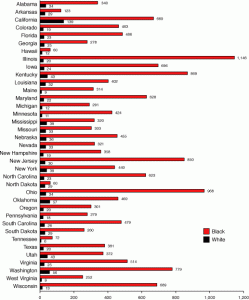You Should Care: Lessons from Ferguson
by Elisabeth Wilder – Horizon Columnist
Since the shooting of Michael Brown in Ferguson, Missouri, frequent instances of riots, violence, looting, and chaos have erupted in the city. Brown, an unarmed, young black man, was shot by a local white police officer on Aug. 9. Subsequently the city has cried out for justice for what appears to be the consequences of racial profiling.
The violence in Ferguson is only the latest installment of the dangers and injustice of racial profiling. Over the years, racial profiling has taken on many forms, from the placing of Japanese-Americans in prison camps in the 1940’s, to the harassment and suspicion of people from the Middle East after 9/11, and in more recent news, the shooting of Trayvon Martin. In each of these cases, racial profiling has attempted to bring justice or security to others, but instead it has had the adverse effect and led to conflict and polarization between races.

In her book, “The New Jim Crow,” Michelle Alexander tackles the issue of racial profiling and the consequences it has on African Americans in the justice system. For example, according to a national survey done by the National Institute on Drug Abuse, white students use cocaine and heroine at seven times the rate of black students, but in at least 15 states, people of color are 20-57 times more likely to be sentenced to prison for drug offenses according to the Human Rights Watch.
Yeah, racial profiling is bad, but why does racial profiling matter to us on campus? In the examples mentioned above, we have seen the extreme examples of the dangers of racial profiling, but there are other patterns of racial profiling here on campus that come with their own set of consequences. What groups of students typically are complained about the most? Who comes to mind when we think of students who don’t follow community standards? Why do these groups of students come to mind?
As humans, we have a tendency to look for things that confirm what we believe. If we put someone under the microscope long enough, eventually we will find that flaw or that slip-up we were looking for. It’s a concept sociologist call the self-fulfilling prophecy. In other words, the self-fulfilling prophecy starts with a false perception, which in turn causes a new behavior and proves the original false idea; thus giving validity to the original idea.
The message of this article is not to point fingers, pick sides, or attack a group of people. Consciously or subconsciously, all of are coming to school with preconceived notions about different groups of people. Let’s give each student a chance before we put his or her character into a box. Whether it’s color, their sport, where a person’s from, or any other stereotype you can think of, let’s learn from Ferguson and agree to put preconceived and false perceptions behind.
Elisabeth Wilder’s column, “You Should Care” will explore current events and will appear in each issue of the Horizon. Elisabeth is a sophomore disaster management major.



